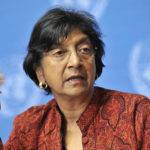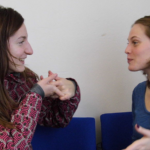
The borders of virtue and power
Closing borders: to refugees, to undocumented migrants, raises questions of virtue and questions of power.
The public debate around borders is so fractured, so superficial, so bedevilled with assumption and ritual conflict that it conveys little new meaning. It simply reiterates the existence of a continuing contest – a contest that often is more about power than rights.
In this contest we see progressively increasing brutality and violence. Resort to force, implicit or explicit, is the modern day tool of choice underpinning this public debate. Whether in the sophisticated armory and defenses of international borders or the increasing instances of riot of those who assert their freedom. The tiny island of Lampedusa saw such an example this week: naked brutality (in this case state violence) in a dispute that now spans the globe. It is hardly an isolated instance, and to hold those on that tiny part of the Earth solely responsible, either those who have arrived uninvited, or those who respond with violence, would be unfair. Beyond the shores of the island stuctures of power, questions of virtue have played out. The entire way in which we see borders and what they mean to us creates the circumstances where such violence, in one form or another, becomes in the end, a virtual certainty.
What is clear is that for our fellow human beings to be violently beaten in such circumstances is contrary to everything we would recognise as human virtue: kindness, hospitality, friendship, generosity. Where we find such virtues absent we may readily conclude that change is required.
What change however? It is clear that such conduct, right or wrong, is an exercise in human power. So perhaps this is where questions need to be asked.
Power is so pervasive in human relationships that it is indeed hard to think of human beings relating to each other in sensible ways without power being central to those relationships. Yet at the heart of human rights are notions of equality, brotherhood and human dignity that stand in tension to power. Indeed the central idea of human rights is that power may never be exercised in ways that violate these notions.
On the other side of the planet, on a much larger island, the High Court of Australia was faced with these questions when considering the fate of asylum seekers challenging government laws seeking to deport them to Malaysia. The High Court began with the fact of contest:
“These proceedings involve legal issues which arise in a strongly contested area of public policy. The public policy contest relates to the way in which Australia deals with non-citizens who enter its territory by sea without visas and invoke Australia’s protection obligations under the Convention relating to the Status of Refugees (1951) as amended by the Protocol relating to the Status of Refugees (1967) (“the Refugee Convention”).”
Having noted the struggle for power, the Court retreats to its inaccessible temple: interpretation of the law. Of course it must, for this its role. Yet in political life the contest for power continues: a contest between those who have power, those who desire it, those who seek to preserve it. The law in such circumstances may become meaningless or at worst an instrument of oppression. It is only accidents of power that will determine the eventual outcome for those who seek refuge in Australia, or so it seems.
Much of the debate in Australia where human rights is concerned has asserted the right of democratic decision making in such matters. The will (the power) of elected parliaments must not be constrained by unelected judges. It is a simplistic argument. For here we face questions of what we mean by “democratic”. For those who elected the parliaments exercise by proxy power not only over themselves, but over those who have never had a say – never had a vote. Questions of power again at the centre of matters.
So much of human history has been about power. Yet the world has changed. Not so much that power does not matter. But enough that we might begin to question whether we wish our future to be determined by ‘power’. We no longer wish questions of fundamental human relationships to be decided solely or even predominantly by power. For the ultimate end of power is the enslavement of those who do not have it. It is clear enough that we do not wish such a future for ourselves or others. If power is no longer to be so central an ordering principle – then where do we find the principles on which order can be built?
It is in this context that we face the question of borders. The imbalances in the world drive a desperation to escape. It is a reasonable desperation. A desperation that comes to point of conflict at the border. If we would not make slaves of ourselves and others then it is at that point that conflict must be removed. If we would have human relationships conditioned by human virtue rather than human power, the borders must be opened. If we admit as much, perhaps we can find a sensible basis of public debate. Let us frankly admit that no theory of justice worth the name renders fair or just what we see happening at our borders. Let us also carefully consider the current ordering of affairs, where the well to do and citizens of the global north have freedom of movement, but the poor of the global south do not: and ask if this can be just.
Human virtue calls us to better. So ought we not seriously to begin to ask how we can walk the journey from where we are to where we might be? But what would a world with open borders look like? How might we ensure that new injustices do not replace the old? Perhaps we have arrived at the point where such questions must seriously be asked. Not solely as tools of rhetoric but as the subject of careful and searching examination. Lives are at stake.
Image Source: Creative Commons http://www.flickr.com/photos/gisellavecchi/5649945056/







